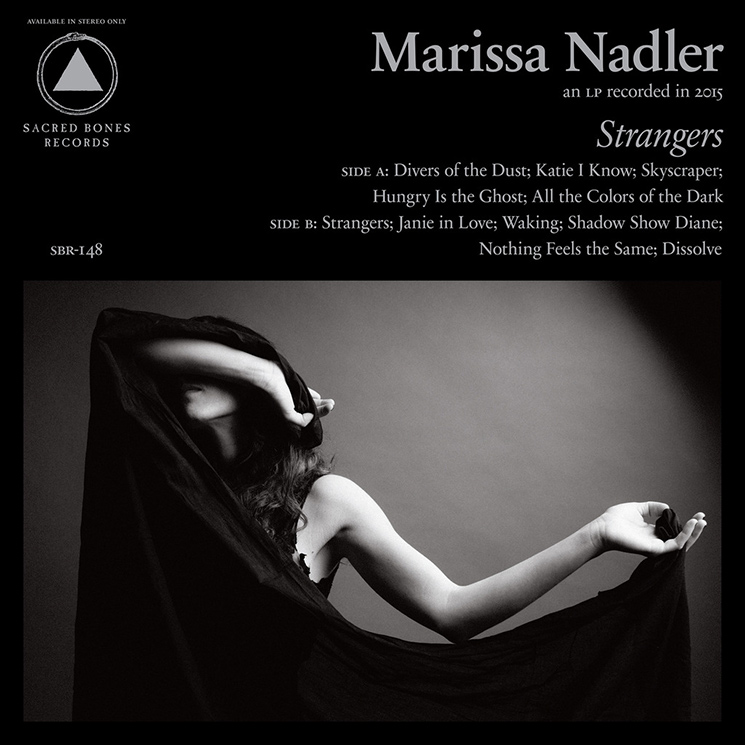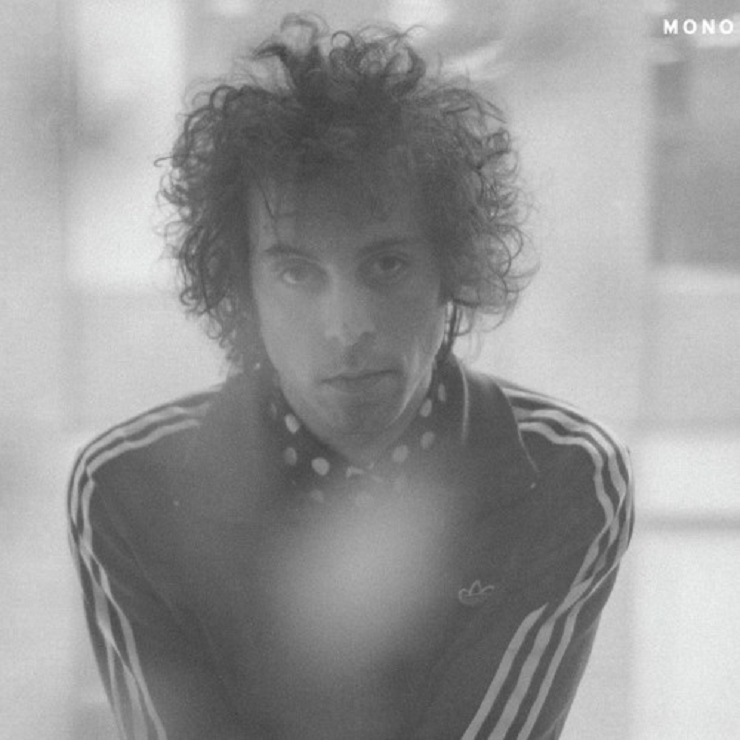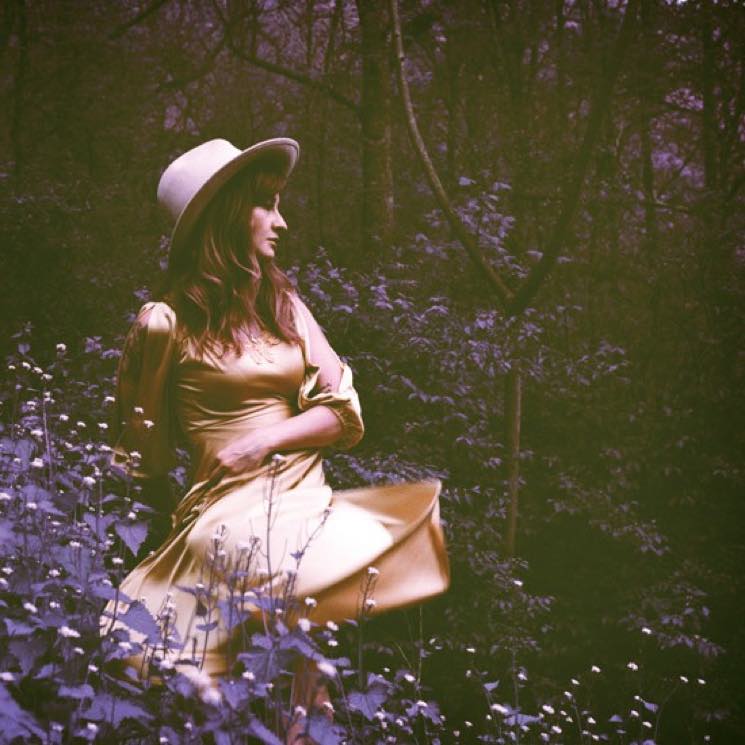Our Best of 2016 albums lists by genre continue today with our staff picks for the 10 best folk and country albums of 2016.
Click next to read through the albums one by one, or use the list below to skip ahead to your favourites.
Top 10 Folk & Country Albums of 2016:

10. Weyes Blood
Front Row Seat to Earth
(Mexican Summer)
Natalie Mering is a modern producer trapped in the body of a classic songwriter. For her second album, Front Row Seat to Earth, she splits the difference, delivering nine Laurel Canyon-indebted broken heart piano jams that, in the wrong hands, could have fallen into an embarrassing renaissance-fair balladry. Mering's know-how behind the boards — gleaned from years as a collaborator with musicians like Ariel Pink and aided here by Chris Cohen —gives her music an otherworldly quality that no doubt helped to inspire the album's title.
Stacks of vocals, synths and even old movie clips underscore her heart-baring lyrics. Just as she creates tension in her music by mixing the classic and the modern, Mering's lyrics convincingly captures the frightening sense of loneliness that comes with the dissolution of any relationship. Front Row Seat to Earth is a fraught yet thrilling view of a personal apocalypse.
Ian Gormely

9. Ryley Walker
Golden Sings That Have Been Sung
(Dead Oceans)
In 2015, Ryley Walker released the best album your friends who like Phish still probably haven't heard but should: Primrose Green, a collection of jammy, jazzy, freewheeling folk songs that would have sounded good whether they lasted for four minutes or 14 (some of them did in concerts).
Golden Sings That Have Been Sung, on the other hand, is a far more restrained affair. Where listening to his previous album felt like getting caught in a dense, psychedelic whirl about to fall off its orbit, everything feels simpatico this time around, with each instrument (including Walker's Van Morrison-lite vocals) finding a place to call home in any arrangement. That's a testament to former Wilco multi-instrumentalist LeRoy Bach's strength as a producer as much as to Walker's growing strength as a songwriter.
Golden Sings is the perfect reintroduction to a talented composer and performer whose career is about to reach new heights.
Matthew Ritchie

8. Veda Hille
Love Waves
(Independent)
It's been six months since this amazing record burst onto the scene, and it still feels fresh; I'm looking forward to listening to Veda Hille's Love Waves five or 10 years from now — it's one of those albums. This unlikely dance party about art and middle age, motherhood and marriage, riddled with kid logic, defies categorization. I'm going to call the genre: Veda Hille.
It's an omnivorous one, one that brilliantly ties together all of time in one instant by grafting flickering computer bleeps to the end of a baroque pop song on "Eurydice" — and who knew Ford Pier could sing like that? High fives to JC/DC for making it sound so huge, so great. Hille draws from David Bowie, Brian Eno, Gilbert & Sullivan, Rilke and her own life to create something truly remarkable here.
Sarah Greene

7. Marissa Nadler
Strangers
(Sacred Bones)
Marissa Nadler's vocals on her newest record are as dreamy and ethereal as ever. They hang in the foreground, never quite being the sole focus but always grabbing the listener's attention, working in tandem with crystal-clear guitar chords and gorgeous backing instruments to provide a dark experience not found in mainstream singer/songwriter music. So downbeat and ominous is Strangers that metal band Ghost chose her as an opening act for their latest tour, fully confident in her ability to sway crowds of discerning rock fans with her sombre, hypnotic performances.
This is Nadler's seventh studio album, following up the success of her 2014 release July, and the two records' similar cover art illustrates a Gothic link between them that may possibly continue. Time will tell if Strangers will be indicative of her legacy as a songwriter, but even if, god forbid, she were to stop tomorrow, it would be a legacy worth leaving.
Adam Nizam

6. Cass McCombs
Mangy Love
(Anti-)
Over the past decade-and-a-half, Cass McCombs has quietly and confidently developed into a wry psych-folk veteran, and his experience shows in spades on Mangy Love.
While McCombs's songwriting style still feels earnest and conversational, he takes a smooth and smoky soft-rock approach to many of the arrangements here that strain at the traditional confines of what one would consider "folk" music. These ethereal sound beds backdrop McCombs's trademark array of wily characters and off-the-cuff witticisms, revealing little details and turns of phrase that are woven into his narratives.
McCombs uses this platform to explore relationships, friendships and infatuations in all their messy and confounding glory. He does a remarkable job of illustrating the often surreal, dream-like moments of lucidity where the proverbial house is turned upside down and we exist in little augmented worlds with those we care about.
Cole Firth

5. Daniel Romano
Mosey
(New West Records)
Musical mad scientist that he is, it's logical that Daniel Romano would craft a record that grapples with so many man-made monstrosities. Scan the liner notes to his records, where he's often credited with playing every instrument, writing every song and producing every note, and you get a sense of the breadth of his talent. Mosey, though, is something different; it more clearly conveys the sensitive intelligence that propels Romano's artistic mind.
He's couched these songs in a certain studio hue; occasionally the symphonic arrangements pop out like sepia-soaked theme songs for flashy 1970s action TV shows, but the songs themselves are biting and gritty, their measured, aching deliveries belying a seething condemnation of the cult of personality and fashion consciousness that we've come to embrace like a default setting.
Romano himself knows that; because of his penchant for Nudie suits, giant Stetsons and moustaches, he's painted himself an image. This is the sound of a man fighting his way out of his own corner.
Vish Khanna

4. case/lang/veirs
case/lang/veirs
(Anti-)
Let's face it — most collaborative albums are known to be largely disappointing. For every Dolly, Linda and Emmylou there are a dozen Dylan & the Deads. So what makes the union of Neko Case, k.d. lang and Laura Veirs work so damn wonderfully? It may be because the trio never seem the least bit interested in being in a supergroup, as they find themselves rather content working to each other's strengths, crafting something that sounds equally comfortable and invigorating.
Their 14-track debut manages to avoid sounding bloated, as Case, lang and Veirs possess enough musical intelligence to find the simplicity and beauty essential to each track — even the superb group of musical collaborators (including Wilco's Glenn Kotche, Soul Coughing's Sebastian Steinberg and producer Tucker Martine) serve the songs the way old-time session players were accustomed to. Expertly showcasing Case's from-the-rafters delivery, lang's vintage aesthetic and Veirs' emotional versatility, case/lang/veirs comes off as the sound of three superstars, not one supergroup.
Daniel Sylvester

3. Margo Price
Midwest Farmer's Daughter
(Third Man)
Sometimes, life sucks. There's not much you can do about it; you're going to face some tough times in your life. Now, you can let those hard moments get you down and trample on your spirit, or you can be like Margo Price. On her phenomenal debut record, Midwest Farmer's Daughter, not only does the Nashville transplant present all this torment and strife, but she tackles it head on.
From the hypnotic, slow-burning "Hands of Time," an ode to a life of hardship, to the raw grit of "Tennessee Song" and its guitar that bites and barks, Midwest Farmer's Daughter is full of moments that put to bed any notion that Price is just a talented imitator, as she masters and, indeed, breathes new life into country music. On her first solo outing, Margo Price not only pays homage to the country canon, but suggests she may one day be part of it, alongside Hank, Waylon and Loretta.
Corey Henderson

2. John K. Samson
Winter Wheat
(Anti-)
John K. Samson's sophomore solo record, Winter Wheat, almost feels like more than we deserve. It sprawls like his Prairie hometown of Winnipeg, and is not-so-simply a folk record. Over 50 minutes, he rails against environmental destruction in vicious rock'n'roll fashion with "Vampire Alberta" and whispers in spacey spoken word the thoughts of a delusional truth-seeker on "Quiz Night at Looky Loo's," eventually giving him a companion on the starlit sway of "Alpha Adept."
Each track on Winter Wheat feels dense and endlessly navigable. Samson details the vastness between two people on the delicate familial forgiveness of "Requests," and uses relationships to send messages that resonate on a heartbreakingly global scale on the sweet, wintry title track, which lifts a line from Miriam Toews for a thesis statement: "We know this world is good enough because it has to be." "Oldest Oak at Brookside" wraps Winnipeg's history into a few minutes.
Yet they all remain, at their heart, about connection, its beauty and its consequences. On "Virtute at Rest," when the late Virtute the cat comforts her troubled companion from the bed in the back of his brain, it's at once devastating and inspiring — like all of our most important relationships.
Matt Williams

1. Sturgill Simpson
A Sailor's Guide to Earth
(Warner)
Pitched somewhere between Muscle Shoals soul, outlaw country and Elvis Presley circa On Stage, Sturgill Simpson's bravura third record sounds like little else you're likely to have heard in 2016. A loose concept album based on an itinerant sailor's letters home to his wife and son from overseas, A Sailor's Guide to Earth is reflective, swaggering and spiked with moments of disarming honesty.
It's also profoundly weird. From the woozy flow of "Breaker's Roar" to the rollicking thump of "Keep It Between the Lines" and "Brace for Impact," Simpson weaves his unlikely influences into tight braids that seem at once familiar and exotic. But perhaps most attractive of all is that underneath all of this careful construction lies a sparkling playfulness. There are sound effects, a radical Nirvana cover, political statements and sudden admissions of anguish and loss. It's a high-wire act, pulling all of this off without succumbing to self-indulgence or messiness, but you get the sense that Sturgill Simpson isn't even worried about falling anymore. Hell, he probably thinks he can fly.
And really — who's to tell him he can't?
Stuart Henderson
Click next to read through the albums one by one, or use the list below to skip ahead to your favourites.
Top 10 Folk & Country Albums of 2016:
- 10. Weyes Blood - Front Row Seat to Earth
- 9. Ryley Walker - Golden Sings That Have Been Sung
- 8. Veda Hille - Love Waves
- 7. Marissa Nadler - Strangers
- 6. Cass McCombs - Mangy Love
- 5. Daniel Romano - Mosey
- 4. case/lang/veirs - case/lang/veirs
- 3. Margo Price - Midwest Farmer's Daughter
- 2. John K. Samson - Winter Wheat
- 1. Sturgill Simpson - A Sailor's Guide to Earth

10. Weyes Blood
Front Row Seat to Earth
(Mexican Summer)
Natalie Mering is a modern producer trapped in the body of a classic songwriter. For her second album, Front Row Seat to Earth, she splits the difference, delivering nine Laurel Canyon-indebted broken heart piano jams that, in the wrong hands, could have fallen into an embarrassing renaissance-fair balladry. Mering's know-how behind the boards — gleaned from years as a collaborator with musicians like Ariel Pink and aided here by Chris Cohen —gives her music an otherworldly quality that no doubt helped to inspire the album's title.
Stacks of vocals, synths and even old movie clips underscore her heart-baring lyrics. Just as she creates tension in her music by mixing the classic and the modern, Mering's lyrics convincingly captures the frightening sense of loneliness that comes with the dissolution of any relationship. Front Row Seat to Earth is a fraught yet thrilling view of a personal apocalypse.
Ian Gormely

9. Ryley Walker
Golden Sings That Have Been Sung
(Dead Oceans)
In 2015, Ryley Walker released the best album your friends who like Phish still probably haven't heard but should: Primrose Green, a collection of jammy, jazzy, freewheeling folk songs that would have sounded good whether they lasted for four minutes or 14 (some of them did in concerts).
Golden Sings That Have Been Sung, on the other hand, is a far more restrained affair. Where listening to his previous album felt like getting caught in a dense, psychedelic whirl about to fall off its orbit, everything feels simpatico this time around, with each instrument (including Walker's Van Morrison-lite vocals) finding a place to call home in any arrangement. That's a testament to former Wilco multi-instrumentalist LeRoy Bach's strength as a producer as much as to Walker's growing strength as a songwriter.
Golden Sings is the perfect reintroduction to a talented composer and performer whose career is about to reach new heights.
Matthew Ritchie

8. Veda Hille
Love Waves
(Independent)
It's been six months since this amazing record burst onto the scene, and it still feels fresh; I'm looking forward to listening to Veda Hille's Love Waves five or 10 years from now — it's one of those albums. This unlikely dance party about art and middle age, motherhood and marriage, riddled with kid logic, defies categorization. I'm going to call the genre: Veda Hille.
It's an omnivorous one, one that brilliantly ties together all of time in one instant by grafting flickering computer bleeps to the end of a baroque pop song on "Eurydice" — and who knew Ford Pier could sing like that? High fives to JC/DC for making it sound so huge, so great. Hille draws from David Bowie, Brian Eno, Gilbert & Sullivan, Rilke and her own life to create something truly remarkable here.
Sarah Greene

7. Marissa Nadler
Strangers
(Sacred Bones)
Marissa Nadler's vocals on her newest record are as dreamy and ethereal as ever. They hang in the foreground, never quite being the sole focus but always grabbing the listener's attention, working in tandem with crystal-clear guitar chords and gorgeous backing instruments to provide a dark experience not found in mainstream singer/songwriter music. So downbeat and ominous is Strangers that metal band Ghost chose her as an opening act for their latest tour, fully confident in her ability to sway crowds of discerning rock fans with her sombre, hypnotic performances.
This is Nadler's seventh studio album, following up the success of her 2014 release July, and the two records' similar cover art illustrates a Gothic link between them that may possibly continue. Time will tell if Strangers will be indicative of her legacy as a songwriter, but even if, god forbid, she were to stop tomorrow, it would be a legacy worth leaving.
Adam Nizam

6. Cass McCombs
Mangy Love
(Anti-)
Over the past decade-and-a-half, Cass McCombs has quietly and confidently developed into a wry psych-folk veteran, and his experience shows in spades on Mangy Love.
While McCombs's songwriting style still feels earnest and conversational, he takes a smooth and smoky soft-rock approach to many of the arrangements here that strain at the traditional confines of what one would consider "folk" music. These ethereal sound beds backdrop McCombs's trademark array of wily characters and off-the-cuff witticisms, revealing little details and turns of phrase that are woven into his narratives.
McCombs uses this platform to explore relationships, friendships and infatuations in all their messy and confounding glory. He does a remarkable job of illustrating the often surreal, dream-like moments of lucidity where the proverbial house is turned upside down and we exist in little augmented worlds with those we care about.
Cole Firth

5. Daniel Romano
Mosey
(New West Records)
Musical mad scientist that he is, it's logical that Daniel Romano would craft a record that grapples with so many man-made monstrosities. Scan the liner notes to his records, where he's often credited with playing every instrument, writing every song and producing every note, and you get a sense of the breadth of his talent. Mosey, though, is something different; it more clearly conveys the sensitive intelligence that propels Romano's artistic mind.
He's couched these songs in a certain studio hue; occasionally the symphonic arrangements pop out like sepia-soaked theme songs for flashy 1970s action TV shows, but the songs themselves are biting and gritty, their measured, aching deliveries belying a seething condemnation of the cult of personality and fashion consciousness that we've come to embrace like a default setting.
Romano himself knows that; because of his penchant for Nudie suits, giant Stetsons and moustaches, he's painted himself an image. This is the sound of a man fighting his way out of his own corner.
Vish Khanna

4. case/lang/veirs
case/lang/veirs
(Anti-)
Let's face it — most collaborative albums are known to be largely disappointing. For every Dolly, Linda and Emmylou there are a dozen Dylan & the Deads. So what makes the union of Neko Case, k.d. lang and Laura Veirs work so damn wonderfully? It may be because the trio never seem the least bit interested in being in a supergroup, as they find themselves rather content working to each other's strengths, crafting something that sounds equally comfortable and invigorating.
Their 14-track debut manages to avoid sounding bloated, as Case, lang and Veirs possess enough musical intelligence to find the simplicity and beauty essential to each track — even the superb group of musical collaborators (including Wilco's Glenn Kotche, Soul Coughing's Sebastian Steinberg and producer Tucker Martine) serve the songs the way old-time session players were accustomed to. Expertly showcasing Case's from-the-rafters delivery, lang's vintage aesthetic and Veirs' emotional versatility, case/lang/veirs comes off as the sound of three superstars, not one supergroup.
Daniel Sylvester

3. Margo Price
Midwest Farmer's Daughter
(Third Man)
Sometimes, life sucks. There's not much you can do about it; you're going to face some tough times in your life. Now, you can let those hard moments get you down and trample on your spirit, or you can be like Margo Price. On her phenomenal debut record, Midwest Farmer's Daughter, not only does the Nashville transplant present all this torment and strife, but she tackles it head on.
From the hypnotic, slow-burning "Hands of Time," an ode to a life of hardship, to the raw grit of "Tennessee Song" and its guitar that bites and barks, Midwest Farmer's Daughter is full of moments that put to bed any notion that Price is just a talented imitator, as she masters and, indeed, breathes new life into country music. On her first solo outing, Margo Price not only pays homage to the country canon, but suggests she may one day be part of it, alongside Hank, Waylon and Loretta.
Corey Henderson

2. John K. Samson
Winter Wheat
(Anti-)
John K. Samson's sophomore solo record, Winter Wheat, almost feels like more than we deserve. It sprawls like his Prairie hometown of Winnipeg, and is not-so-simply a folk record. Over 50 minutes, he rails against environmental destruction in vicious rock'n'roll fashion with "Vampire Alberta" and whispers in spacey spoken word the thoughts of a delusional truth-seeker on "Quiz Night at Looky Loo's," eventually giving him a companion on the starlit sway of "Alpha Adept."
Each track on Winter Wheat feels dense and endlessly navigable. Samson details the vastness between two people on the delicate familial forgiveness of "Requests," and uses relationships to send messages that resonate on a heartbreakingly global scale on the sweet, wintry title track, which lifts a line from Miriam Toews for a thesis statement: "We know this world is good enough because it has to be." "Oldest Oak at Brookside" wraps Winnipeg's history into a few minutes.
Yet they all remain, at their heart, about connection, its beauty and its consequences. On "Virtute at Rest," when the late Virtute the cat comforts her troubled companion from the bed in the back of his brain, it's at once devastating and inspiring — like all of our most important relationships.
Matt Williams

1. Sturgill Simpson
A Sailor's Guide to Earth
(Warner)
Pitched somewhere between Muscle Shoals soul, outlaw country and Elvis Presley circa On Stage, Sturgill Simpson's bravura third record sounds like little else you're likely to have heard in 2016. A loose concept album based on an itinerant sailor's letters home to his wife and son from overseas, A Sailor's Guide to Earth is reflective, swaggering and spiked with moments of disarming honesty.
It's also profoundly weird. From the woozy flow of "Breaker's Roar" to the rollicking thump of "Keep It Between the Lines" and "Brace for Impact," Simpson weaves his unlikely influences into tight braids that seem at once familiar and exotic. But perhaps most attractive of all is that underneath all of this careful construction lies a sparkling playfulness. There are sound effects, a radical Nirvana cover, political statements and sudden admissions of anguish and loss. It's a high-wire act, pulling all of this off without succumbing to self-indulgence or messiness, but you get the sense that Sturgill Simpson isn't even worried about falling anymore. Hell, he probably thinks he can fly.
And really — who's to tell him he can't?
Stuart Henderson
